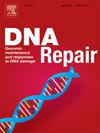利用r环动力学:挑战癌症治疗耐药性
IF 2.7
3区 生物学
Q2 GENETICS & HEREDITY
引用次数: 0
摘要
r环是由一段DNA组成的非典型三链核酸结构:RNA杂交取代了未配对的单链DNA,形成了典型的环状结构。当适当调节时,r -环已被证明可以控制与RNA代谢、表观遗传基因调控、DNA损伤修复、同源重组和DNA复制相关的关键过程。然而,非预定的r环可以诱导DNA损伤,从而损害基因组的稳定性。与这些中心特征一致,癌细胞经常表现出r环代谢失调。癌基因或突变肿瘤抑制基因的作用与R-loop水平的改变有关,这反过来可以破坏生理过程或驱动癌症基因组的不稳定。一组干扰r -环预防、分解或加工的抗肿瘤药物已被证明会加剧r -环介导的基因组不稳定性,调节免疫途径并介导细胞死亡。对这些药物的耐药机制预计包括抵消r -环介导的基因组不稳定性的途径的激活。在这篇综述中,我们将讨论癌细胞中r环的关键调控因子,促进r环形成的治疗策略以及r环与癌症治疗耐药性的相关性。本文章由计算机程序翻译,如有差异,请以英文原文为准。
Harnessing R-loop dynamics: Challenging cancer therapy resistance
R-loops are atypical three-stranded nucleic acid structures composed of a stretch of DNA:RNA hybrids that displace the unpaired, single DNA strand, resulting in the formation of a characteristic loop structure. When properly regulated, R-loops have been demonstrated to control crucial processes related to RNA metabolism, epigenetic gene regulation, DNA damage repair, homologous recombination, and DNA replication. However, unscheduled R-loops can induce DNA damage, thus compromising genome stability. In line with these central features, cancer cells frequently exhibit deregulated R-loop metabolism. The action of oncogenes or mutant tumor suppressor genes is associated with alterations in R-loop levels, which in turn can disrupt physiological processes or drive cancer genome instability. A panel of antineoplastic drugs that interfere with R-loop prevention, resolution or processing has been shown to exacerbate R-loop-mediated genome instability, modulate immunity pathways and mediate cell death. Mechanisms of resistance to these drugs are expected to include the activation of pathways that counteract R-loop-mediated genome instability. In this review, we will discuss key regulators of R-loops in cancer cells, therapeutic strategies that promote R-loop formation and the relevance of R-loops for cancer therapy resistance.
求助全文
通过发布文献求助,成功后即可免费获取论文全文。
去求助
来源期刊

DNA Repair
生物-毒理学
CiteScore
7.60
自引率
5.30%
发文量
91
审稿时长
59 days
期刊介绍:
DNA Repair provides a forum for the comprehensive coverage of DNA repair and cellular responses to DNA damage. The journal publishes original observations on genetic, cellular, biochemical, structural and molecular aspects of DNA repair, mutagenesis, cell cycle regulation, apoptosis and other biological responses in cells exposed to genomic insult, as well as their relationship to human disease.
DNA Repair publishes full-length research articles, brief reports on research, and reviews. The journal welcomes articles describing databases, methods and new technologies supporting research on DNA repair and responses to DNA damage. Letters to the Editor, hot topics and classics in DNA repair, historical reflections, book reviews and meeting reports also will be considered for publication.
 求助内容:
求助内容: 应助结果提醒方式:
应助结果提醒方式:


